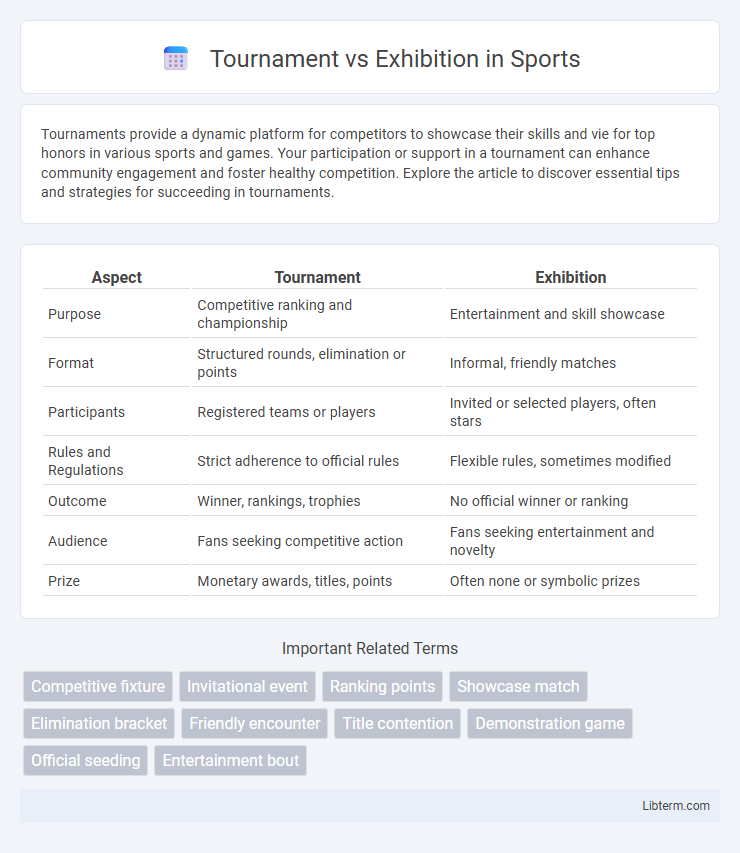Tournaments provide a dynamic platform for competitors to showcase their skills and vie for top honors in various sports and games. Your participation or support in a tournament can enhance community engagement and foster healthy competition. Explore the article to discover essential tips and strategies for succeeding in tournaments.
Table of Comparison
| Aspect | Tournament | Exhibition |
|---|---|---|
| Purpose | Competitive ranking and championship | Entertainment and skill showcase |
| Format | Structured rounds, elimination or points | Informal, friendly matches |
| Participants | Registered teams or players | Invited or selected players, often stars |
| Rules and Regulations | Strict adherence to official rules | Flexible rules, sometimes modified |
| Outcome | Winner, rankings, trophies | No official winner or ranking |
| Audience | Fans seeking competitive action | Fans seeking entertainment and novelty |
| Prize | Monetary awards, titles, points | Often none or symbolic prizes |
Understanding Tournaments: Definition and Purpose
Tournaments are structured competitive events where participants or teams compete in a series of matches to determine a winner, often following specific rules and formats such as single-elimination or round-robin. Their primary purpose is to identify the best player or team through a rigorous process of skill testing and ranking. Unlike exhibitions, tournaments emphasize official competition and ranking, often with significant stakes such as prizes, titles, or qualifications for further competitions.
What Is an Exhibition Match?
An exhibition match is a non-competitive event designed primarily for entertainment, practice, or charity rather than official ranking or prize determination. Unlike tournaments, exhibition matches do not impact player standings or records and often feature flexible rules to encourage creativity and engagement. These matches showcase skill and sportsmanship while providing opportunities for athletes to connect with fans and experiment without competitive pressure.
Key Differences Between Tournaments and Exhibitions
Tournaments are competitive events structured with brackets or rounds where participants compete to win titles, prizes, or rankings, emphasizing performance and elimination criteria. Exhibitions are non-competitive showcases aimed at entertainment or demonstration, often featuring invited participants who perform without formal scoring or rankings. The key differences lie in the objectives, format, and stakes: tournaments focus on competition and rankings, whereas exhibitions prioritize display and audience engagement.
Stakes and Rewards: Tournament vs Exhibition
Tournaments feature high stakes with participants competing for significant rewards such as prize money, trophies, or ranking points that impact their professional status. Exhibitions prioritize entertainment and skill demonstration, typically offering little to no monetary rewards or official recognition. The competitive intensity in tournaments drives participants to perform at peak levels, whereas exhibitions allow for more experimental and relaxed play.
Structure and Organization Comparison
Tournaments feature a structured format with multiple rounds, clear matchmaking, and elimination stages to determine a final winner, emphasizing competitive progression and rankings. Exhibitions, however, have a flexible organization focusing on showcasing skills or entertainment without strict rules, often involving predetermined or non-competitive matchups. Tournament structures prioritize fairness and competition integrity, while exhibitions highlight performance and audience engagement.
Audience Engagement in Tournaments versus Exhibitions
Tournaments generate higher audience engagement through competitive stakes, structured progression, and the excitement of elimination rounds, which sustain viewer interest over an extended period. Exhibitions tend to attract casual viewers with their relaxed atmosphere and showcase of skill without the pressure of winning, but this often results in lower emotional investment from the audience. The unpredictability and viewer participation in tournaments create a more dynamic and interactive experience compared to the scripted or promotional nature of exhibitions.
Player Motivation: Competing in Tournaments vs Exhibitions
Tournaments drive player motivation through high-stakes competition, ranking points, and potential prize money, fostering intense focus and performance under pressure. Exhibitions offer a more relaxed environment, emphasizing skill display, fan engagement, and entertainment without the pressure of official rankings. Players often balance both formats to develop their game, maintain confidence, and connect with audiences.
Role in Sports Development and Promotion
Tournaments serve as competitive platforms that foster skill advancement, talent identification, and audience engagement, crucial for elevating the overall standard of sports. Exhibitions prioritize entertainment and showcase, promoting sports culture and increasing public interest without the pressure of competition. Both formats are essential, with tournaments driving athlete development and exhibitions enhancing visibility and fan base growth.
Historical Examples of Iconic Tournaments and Exhibitions
The Wimbledon Championships, established in 1877, exemplify a historic iconic tournament renowned for its prestigious competition in tennis, emphasizing rankings and titles. In contrast, exhibitions such as the 1976 Muhammad Ali vs. Antonio Inoki match highlighted entertainment and charity aspects rather than official sporting outcomes. These events demonstrate how tournaments prioritize competitive merit, while exhibitions often serve promotional or experimental purposes in sports history.
Choosing the Right Format: When to Host a Tournament or Exhibition
Choosing the right format depends on the goals and audience engagement desired; tournaments are ideal for competitive environments that require structured progression and ranking, while exhibitions suit informal settings prioritizing entertainment and skill demonstration without the pressure of elimination. Tournaments foster heightened player motivation and audience investment through clear stakes and rewards, making them suitable for professional sports and official leagues. Exhibitions provide flexibility for showcasing talent, testing new rules, and building fan interest when competitiveness takes a backseat to experience and community connection.
Tournament Infographic

 libterm.com
libterm.com